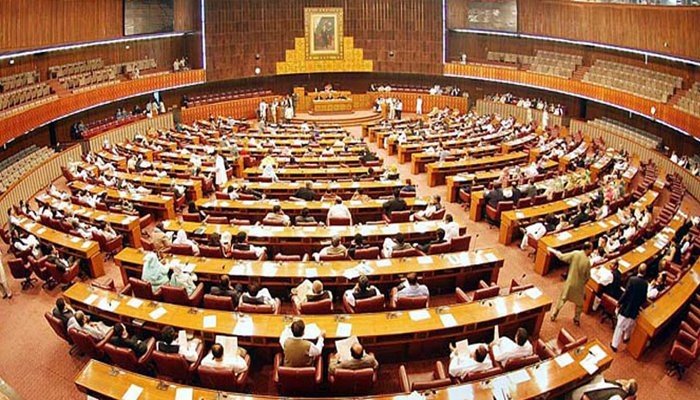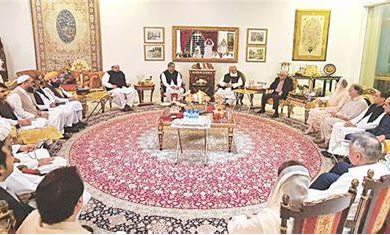The government remained successful in making amendments to the Elections Act, 2017, on Wednesday (17 November) in a joint session of the parliament which even gave voting rights to overseas Pakistanis along with approving the use of Electronic Voting Machines (EVMs).
As a result, the opposition tore up copies of the agenda and protested by walking out of the meeting. Lawmakers also crowded near the Treasury benches, yelling anti-Imran Khan and anti-government slogans.
The sergeants-at-arms were observed standing shoulder-to-shoulder to establish a barrier between the two sides in order to avoid a physical conflict between MPs from the opposition and the government.
According to the 2007 Rules of Procedure and Conduct of Business in the National Assembly, the government needed a majority of the total membership of the NA and Senate, which totaled 222 members, to pass a bill in a joint session.
The government, on the other hand, argued that, under Article 72 of the Constitution, a law must be passed by a simple majority of the members present during a joint sitting. The Constitution, according to NA Speaker Asad Qaiser, takes precedence above the Rules.
The bill on the use of electronic voting machines had previously been deferred at the request of Adviser to the Prime Minister on Parliamentary Affairs Babar Awan, but it was later reintroduced and put to a vote.
The government then went ahead with other important bills including:
- The Elections (Second Amendment) Bill, 2021
- The International Court of Justice (Review and Re-consideration) Bill, 2021
- The Islamabad Capital Territory Charities Registration, Regulation, and Facilitation Bill, 2021
- The National College of Arts Institute Bill, 2021
- The SBP Banking Services Corporation (Amendment) Bill, 2021
- The Muslim Family Laws (Amendment) Bill, 2021 (Amendment in Section 4)
- The Muslim Family Laws (Amendment) Bill, 2021 (Amendment in Section 7)
- The Anti-Rape (Investigation and Trial) Bill, 2021
- The Hyderabad Institute for Technical and Management Sciences Bill, 2021
- The Islamabad Rent Restriction (Amendment) Bill, 2021
- The Criminal Law (Amendment) Bill, 2021
- The Corporate Restructuring Companies (Amendment) Bill, 2021
- The Financial Institutions (Secured Transactions) (Amendment) Bill, 2021
- The Federal Public Service Commission (Validation of Rules) Bill, 2021
- The University of Islamabad Bill, 2021
- The Loans for Agricultural, Commercial and Industrial Purposes (Amendment) Bill, 2021
- The Companies (Amendment) Bill, 2021
- The National Vocational and Technical Training Commission (Amendment) Bill, 2021
- The Pakistan Academy of Letters (Amendment) Bill, 2021
- The Port Qasim Authority (Amendment) Bill, 2021
- The Pakistan National Shipping Corporation (Amendment) Bill, 2021
- The Gwadar Port Authority (Amendment) Bill, 2021
- The Maritime Security Agency (Amendment) Bill, 2021
- The Emigration (Amendment) Bill, 2021
- The Privatisation Commission (Amendment) Bill, 2021
- The Covid-19 (Prevention of Hoarding) Bill, 2021
The following bills presented through supplementary agenda were also passed:
- The Islamabad Food Safety Authority Bill
- The Greek, Ayurvedic, and Homeopathic Practitioners Bill, 2021
- The Prevention of Corruption Act (Amendment) Bill
- The Electric Power (Amendment) Bill, 2021
- The Provincial Motor Vehicles (Amendment) Bill
The Al-Karam International Institute Bill, 2021, sponsored by the PML-Syed N’s Javed Hasnain, and the Islamabad Capital Territory Prohibition of Corporal Punishment Bill, 2021, presented by PML-N MNA Mehnaz Akber Aziz, were among the 33 bills passed.
The Elections (Amendment) Bill, 2021, was deferred, while a Jamaat-i-Islami amendment calling for the public execution of rapists was rejected.
In a joint session, the parliament also enacted a bill to provide for the right of review and reconsideration in the Kulbhushan Jadhav case in order to put the International Court of Justice’s verdict into force.
Law Minister Farogh Nasim introduced the International Court of Justice (Review and Reconsideration) Bill, 2020. It was approved by a large majority of the voters.
According to the bill’s statement of objects and reasons, the Indian government filed a complaint with the International Court of Justice (ICJ) against Pakistan for alleged violations of the Vienna Convention on Consular Relations in the case of an Indian national, Commander Kulbhushan Sudhir Jadhav of the Indian spy agency RAW, who was sentenced to death by a military court in Pakistan in April 2017.
The International Court of Justice (ICJ) issued its decision on July 17, 2019, stating that Pakistan was required to provide effective review and reconsideration of Jadhav’s conviction and sentence through means of its own choosing, in order to ensure that full weight was given to the effect of the violation of the rights set forth in Article 36 of the Vienna Convention, taking into account paragraphs 139, 145, and 146 of the judgment.
A mechanism for review and reconsideration of Pakistan’s own option must be given in order for the aforementioned ruling to have full effect.



